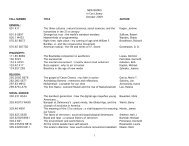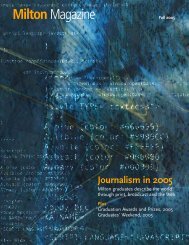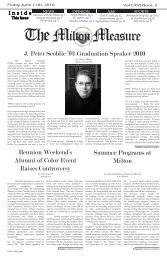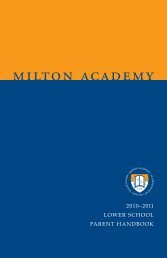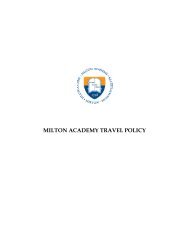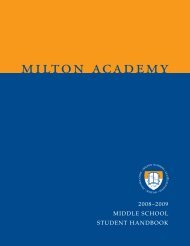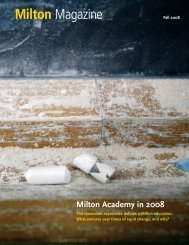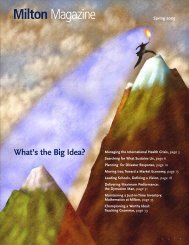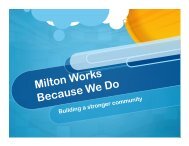Spring 2007 - Milton Academy
Spring 2007 - Milton Academy
Spring 2007 - Milton Academy
- No tags were found...
You also want an ePaper? Increase the reach of your titles
YUMPU automatically turns print PDFs into web optimized ePapers that Google loves.
The most powerful philanthropists areaffecting the social and political order,worldwide: Bono and Bill Clinton use personalinfluence to galvanize world actionto treat and contain the HIV/AIDS virus.George Soros has linked some of his fundingprojects directly to demonstrations ofopen, transparent governments. TheRockefeller Foundation is partnering withthe Gates Foundation to move lessonslearned about improving agricultural productivityfrom South America to Africa.Leveraging Donors’ DollarsThe opportunity to be an influentialactivist is not limited to Warren Buffett,Larry Page and Sergey Brin of Google, orPierre Omidyar of eBay, however. Thegrowth of aggregated funds (nonprofitsstructured like mutual funds except thattheir purpose is to invest in problemsolvingideas) allows donors at all levels toleverage their dollars. Individuals can giveto one of the many aggregated fundswhere full-time staffers with M.B.A.s andPh.D.s help identify, evaluate and supportenterprises meant to accomplish systemicchange.A consultant with the Monitor Institute,Owen figures in this new environment ofphilanthropy—bringing managementexpertise to foundations, nonprofit organizationsor philanthropic venture-capitalfunds, ensuring that they have solid businessplans with rigorous and relevantperformance metrics that make themaccountable for results.Owen’s firm, which operates within theumbrella of the international managementconsulting company, Monitor Group,wants to be a leader in anticipatingchanges and applying new approaches toaddressing complex social challenges.The Acumen Fund was Owen’s latestmajor project. Acumen Fund is a nonprofitinvestment fund that operates somewhatlike a venture-capital firm. They lookfor market-based approaches that providebasic services to populations makingunder $4 a day. Jennifer Lee wrote in theNew York Times recently that AcumenFund’s vision responds to “a desire to reinventphilanthropy and push the boundariesof how people who had done wellcould also do good.” One of AcumenFund’s tenets is that markets work for thepoor, not just the rich. Philanthropy hasalways addressed immediate needs; thenew philanthropic models try to couplemeeting needs with creating sustainableprojects that contribute to broad, economicand social progress.“Small amounts of philanthropic capital,combined with large doses of businessacumen, can build thriving enterprisesthat serve vast numbers of the poor,” theAcumen Fund Web site claims. “Ourinvestments focus on delivering affordable,critical goods and services—likehealth, water and housing—through innovative,market-oriented approaches.”A representative project, for instance,combats malaria, which kills at least onemillion people each year. Acumen Fundcreated a public-private partnership withWHO, UNICEF, Sumitomo, ExxonMobiland an African bed-net maker to manufacturean anti-malarial bed net. Typical bednets must be treated every six months andare prone to tearing. The new bed net producedby A–Z Textiles Mills—althoughmore expensive than the old bed nets—kills mosquitoes on contact for five yearsand is non-tearable. The nets are selling,and making them has created more than100 jobs. Instead of the traditionalapproach of buying several thousand bednets and distributing them to the poor,Acumen Fund’s investment and managementassistance allowed A–Z to expand itsoperations dramatically—their bed netsnow protect over 6 million Tanzaniansfrom malaria.Acumen Fund has also invested in anew drip irrigation system engineered byInternational Development Enterprises inIndia. Subsistence farmers can buy thesystem for $30, far less than the price oftypical irrigation systems. With increasedland productivity, the system pays for itselfquickly. Incomes increase and farmers buya second and third system, ultimatelybeginning to accumulate wealth.Other investments help urban squatters inPakistan build cinderblock homes andachieve tenure security and legal title tothem; or provide small capital loans to4 <strong>Milton</strong> Magazine



